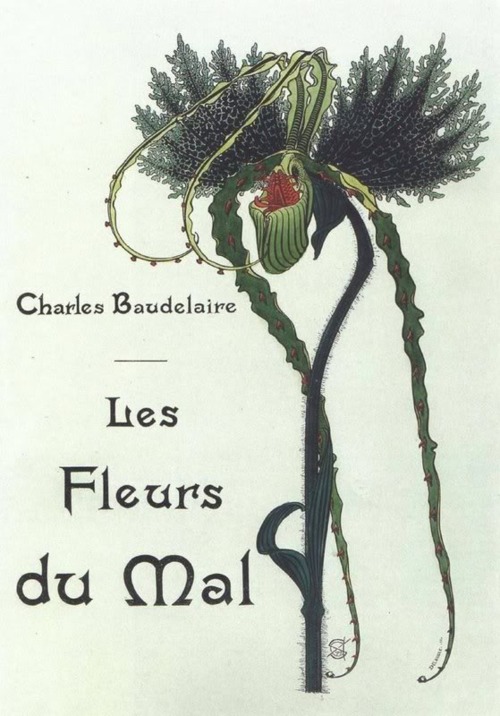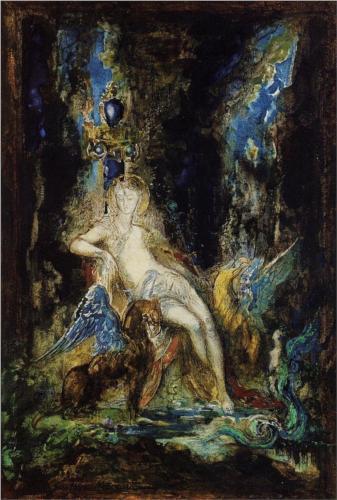Charles Baudelaire (1821-1867)
Baudelaire died before the Decadent Movement really began, but his work had an immense impact on it. He led writers deeper into the Romantic exploration of internal spaces and extreme emotional states. Baudelaire, himself, remained very ambivalent about these moves, and his sensuality was often accompanied by strong moral judgments. In his essays on alcohol and hashish, for example, ecstatic descriptions of the experience of these substances were followed by strong condemnations of their use. The later Decadents, however, ignored such warnings and, instead, immersed themselves in the kinds of sensual experiences that Baudelaire had helped make available to them.
Be Drunk
by Charles Baudelairetranslated by Louis Simpson
You have to be always drunk. That's all there is to it—it's the only way. So as not to feel the horrible burden of time that breaks your back and bends you to the earth, you have to be continually drunk.
But on what? Wine, poetry or virtue, as you wish. But be drunk.
And if sometimes, on the steps of a palace or the green grass of a ditch, in the mournful solitude of your room, you wake again, drunkenness already diminishing or gone, ask the wind, the wave, the star, the bird, the clock, everything that is flying, everything that is groaning, everything that is rolling, everything that is singing, everything that is speaking. . .ask what time it is and wind, wave, star, bird, clock will answer you: "It is time to be drunk! So as not to be the martyred slaves of time, be drunk, be continually drunk! On wine, on poetry or on virtue as you wish."


Gustave Moreau, Fairy and Griffon (1876)
From Baudelaire's The Poem of Hashish
It is, in fact, at this period of the intoxication that is manifested a new delicacy, a superior sharpness in each of the senses: smell, sight, hearing, touch join equally in this onward march; the eyes behold the Infinite; the ear perceives almost inaudible sounds in the midst of the most tremendous tumult. It is then that the hallucinations begin; external objects take on wholly and successively most strange appearances; they are deformed and transformed. Then the ambiguities, the misunderstandings, and the transpositions of ideas! Sounds cloak themselves with color; colors blossom into music. That, you will say, is nothing but natural. Every poetic brain in its healthy, normal state, readily conceives these analogies. But I have already warned the reader that there is nothing of the positively supernatural in hashish intoxication; only those analogies possess an unaccustomed liveliness; they penetrate and they envelop; they overwhelm the mind with their masterfulness. Musical notes become numbers; and if your mind is gifted with some mathematical aptitude, the harmony to which you listen, while keeping its voluptuous and sensual character, transforms itself into a vast rhythmical operation, where numbers beget numbers, and whose phases and generation follow with an inexplicable ease and an agility which equals that of the person playing.
If you are one of these souls your innate love of form and color will find from the beginning an immense banquet in the first development of your intoxication. Colors will take an unaccustomed energy and smite themselves within your brain with the intensity of triumph. Delicate, mediocre, or even bad as they may be, the paintings upon the ceilings will clothe themselves with a tremendous life. The coarsest papers which cover the walls of inns will open out like magnificent dioramas. Nymphs with dazzling flesh will look at you with great eyes deeper and more limpid than are the sky and sea. Characters of antiquity, draped in their priestly or soldierly costumes, will, by a single glance, exchange with you most solemn confidences. The snakiness of lines is a definitely intelligible language where you read the sorrowing and the passion of their souls. Nevertheless a mysterious but only temporary state of the mind develops itself; the profoundness of life, hedged by its multiple problems, reveals itself entirely in the sight, however natural and trivial it may be, that one has under one’s eyes; the first-come object becomes a speaking symbol.